-
Bio: Carlos Mendoza
July 19, 2012
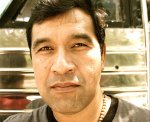
Carlos Mendoza used to have a good job in Mexico working in the financial department of a auto-parts factory, however in 2001 as a result of the National Free Trade Agreement (NAFTA) he saw as his co-workers were replaced, and eventually lost his job. He moved to the U.S. in 2003 to North Carolina, first by himself, and then with the rest of his family. When the 287(g) program was implemented in his community four years ago, he first thought it would be a good thing targeting people who were dangerous for the neighborhood. However, he soon began to see check points all over the city, targeting people who had families, who were workers, his neighbors. This is when he began to volunteer with his church and local organizations. Then he had a work-related accident, where he broke both of his wrists, and his employer refused to support him. It took an entire community-led campaign to make his employer accountable. This is when Mendoza realized that community organizing works, and has become a worker’s rights advocate in North Carolina. He is on the bus because he wants his children to grow up and live without fear, in a country that provides all opportunities to succeed.
Read More » -
Bio: Victor Alvarez
July 19, 2012
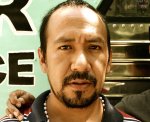
Victor Alvarez has lived in the United States for the last 15 years. He migrated from Mexico looking for a better life and opportunities. He has worked in farms in Pennsylvania and South Carolina picking blue berries, apples, and pears for three years. He eventually moved to North Carolina, the place where he has made his home. He became involved in immigrant rights organizing in 2006, when local organizations began to work against the bill SB 1070, which criminalized undocumented immigrants and supporters. He began to volunteer with community organizations, including the Coalición de Organizaciones Latino Americanas (COLA) in Charlotte, as well as his church. He continues his advocacy work pushed by seeing families separated every day by deportation programs. He is on the bus because he is fighting for the future of his family, “so that tomorrow we can hold our head high without looking down, and be able to unite to create something positive. We can leave fear behind, but we need to change the laws too.”
Read More » -
Bio: Gabriela Alcazar
July 19, 2012
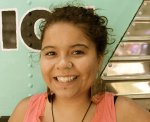
Gabriela Alcazar was born in Chicago, Illinois and considers Detroit, Michigan her home. Although she is not undocumented herself, she remembers waiting for her mother at the U.S. Mexico border, and “the fear and uncertainty that comes with not knowing whether I would get to see my mom.” She has been in immigration offices and government agencies since she was 10 years old, interpreting for her family. It was there that she noticed that people with lawyers were treated better, and decided that she would become an attorney that would help immigrants who could not afford lawyers. Since then she has found other options to support Latinos and immigrants, in particular community organizing. She stepped up her involvement in immigrant rights organizing when her brother in law was deported, while at her school a student organization was putting together a “catch an illegal immigrant” game. She is on the bus because she believes that there is power in undocumented people organizing, and that these actions “have the potential to shift the tide so that the country is more inclusive of all undocumented people.”
Read More » -
Bio: Julio Salgado
July 19, 2012
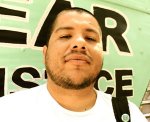
Julio Salgado lives in Berkeley, California and is the Art Director of Dreamers Adrift, a creative project documenting the struggles of undocumented youth. He arrived in California from Mexico in 1995 when he was 11 years old, and became undocumented as a child when he overstayed his visa. Julio is a leader in implementing cultural organizing tactics in the immigrant rights movement, and believes that we (undocumented people) should be leaders in documenting our history. He has a bachelors degree in journalism from California State University and is riding the bus because “[he] want[s] to make sure other folks know we have to come out and not be afraid.”
Read More » -
Bio: David Ramirez
July 19, 2012
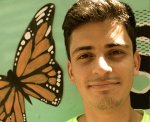
David Ramirez was brought to Chicago from Mexico by his parents in 1991 when he was one year old. In Chicago, he attended one of the best public high schools in the country but his options for college were limited by his immigration status. He was unable to attend many of the universities he was accepted to because he was ineligible for financial aid. However, he received support from Dominican University and graduated from there in 2011. Before graduating, he was arrested in Atlanta protesting a bill that prohibited undocumented students from attending Georgia's highest ranked public universities. He is riding the bus because he is frustrated by the ways his status has continued to limit his opportunities after graduating college and he wants to see more of the United States.
Read More » -
Bio: Martin Unzueta
July 19, 2012
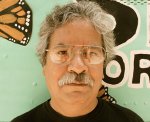
In 1994 Martin Unzueta was offered a job in Chicago IL. He thought in this country there would be better educational opportunities for his children. In Mexico Martin had a small company that made books and paper. The company was not doing so well, it was hard to compete with bigger companies and government officials’ corruption hindered the business’ functions; It became harder to sustain his family. In Chicago, Martin is the executive director of a non for profit organization that helps to organize and defend workers rights in their workplace. He is on the bus because “I want other communities to hear our stories of how we have helped to organize and support workers in Chicago, and the necessity for each community to protect the rights we have at work. We need to learn to use the tools we do have to defend these rights.”
Read More » -
Bio: Rosi Carrasco
July 19, 2012
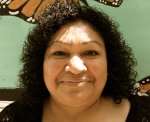
Rosi Carrasco has made a home for her family in Chicago IL for the past 18 years. She came to the US to reunite her two daughters with her husband, who had taken a job in Chicago. In Mexico, Rosi workers doing education research and planning. Now she works organizing the Latino community to fight for their rights. She has seen all the obstacles her daughters have overcome to finish their studies in this country due to their immigration status, and supports their struggles and decisions as best as she can. “I think it’s important to show solidarity with the struggle the youth have done for access to education, and show solidarity with the workers fighting for their right to jobs with dignity. I believe we should keep organizing our communities, even in an electoral year”
Read More » -
Bio: Yovany Diaz Tolentino
July 19, 2012
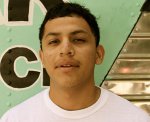
Yovani Diaz Tolentino came to the US when he was 5 months old with his mother, looking for better financial opportunities, a better job and life. Now 20 years old, Yovani has lived in Roswell, Georgia for 12 years. He cleans houses and works with the Georgia Undocumented Youth Alliance (GUYA), an undocumented youth led organization that support the undocumented community in Georgia. He is on the bus “to change the perspective of voters and fight for justice, helping to obtain an immigration reform that benefits America as a whole, including undocumented people.”
Read More » -
Bio: Sean McClellan
July 19, 2012
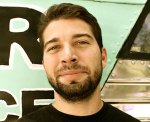
Sean McClellan was born and raised in Chicago, Illinois. He is a volunteer and organizer with the Immigrant Youth Justice League, an organization led by undocumented people. He attended the University of Chicago and got a degree in anthropology and pre-med. During his college time he spent two summers in Guatemala, where he interned at a medical non-governmental organization. It was here that he began to see the effects of United States immigration and deportation policies, and how much two countries are connected. Through his service work he began to become interested in organizing, recognizing the need to address structural problems that would not be addressed “unless people who are directly affected have more power.” In the fall of 2011 he attended a hearing about the Secure Communities program in Chicago, and witnessed a civil disobedience by 5 undocumented organizers from the Immigrant Youth Justice League. He says the need for a change in immigration legislation is a “big moral crisis that is not being addressed as a crisis.” He is on the bus because he is “frustrated with the way our immigration system treats people. I want more people to fight back against it.”
Read More » -
Bio: Fernando Lopez Sanchez
July 19, 2012
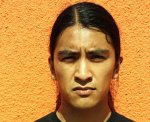
Fernando Lopez Sanchez knows what it is like to be in an immigration detention center. Last summer he was turned over to immigration authorities in Phoenix, Arizona after being pulled over, and after he could not present a Driver’s License. He says that while he was in detention he experienced the psychological abuse that undocumented detainees go through. “They made me feel like a criminal, like I was not worth more than a piece of paper.” He was able to get out of detention after support from the community and organizations like Puente Human Rights Movement. He is traveling on the bus, and taking the risk of being targeted once again by immigration authorities “to promote self determination of communities, to expose abuses in detention centers for migrants, and to bring justice for families.”
Read More »